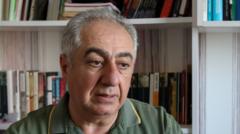As COP29 unfolds in Azerbaijan, accusations arise regarding the detention of climate activists, prompting calls for reevaluation of how host countries for climate summits are selected. Experts stress the importance of protecting civil society to advance climate action.
COP29 Under Scrutiny Amid Allegations of Climate Activist Detention

COP29 Under Scrutiny Amid Allegations of Climate Activist Detention
Human rights organizations accuse Azerbaijan of repressing climate defenders during COP29, as concerns about hosting practices and political prisoners grow.
In the midst of the COP29 climate conference in Azerbaijan, the treatment of environmental activists has drawn serious backlash, overshadowing important discussions on climate action. Human rights groups have raised alarms over the Azerbaijani government's repression of climate defenders, including the case of prominent LSE professor Gubad Ibadoglu, who has faced detainment for nearly 18 months. His continued incarceration highlights the worrying trend of targeting civil society under the guise of political maneuvers in a nation attempting to project leadership on global climate efforts.
Reports emerging from various international organizations suggest a disturbing pattern of authorities employing COP29 as a façade for silencing dissent. The Climate Action Network, comprising nearly 2,000 member groups, insists that without the active support and protection of civil society, significant progress on climate issues is unlikely. Critics point out this is the third consecutive year that a climate summit host has been accused of curtailing protest and democratic freedom, a trend that raises urgent questions about the credibility and integrity of the COP process.
Azerbaijan's commitment to fossil fuels is also under scrutiny, as the nation plans to enhance its oil and natural gas production—a stark contradiction to global emissions reduction goals. Despite urging from environmental advocates, President Ilham Aliyev's remarks during the conference emphasized the positive role of fossil fuels without acknowledging dissent or the political climate within his country.
Reports indicate that two months after co-founding an organization aimed at urging government compliance with the Paris Agreement, Anar Mammadli was detained on smuggling charges. Other activists have similarly faced dubious criminal accusations, raising concerns about a systematic effort to stifle any criticism of government actions related to climate and other pressing issues.
As many activists become political prisoners, experts insist that the international community must reconsider the criteria for selecting host nations for conferences that should prioritize environmental accountability. Additionally, calls have been made for the UN to enhance its oversight regarding human rights conditions in potential host countries.
The position of civil society in these global assembly spaces cannot be overstated. Historically, these groups have played critical roles in lobbying for necessary climate measures, including the establishment of a loss and damage fund, which aims to support vulnerable nations.
Amidst growing international scrutiny, the response from the Azerbaijani government has been dismissive, with officials rejecting allegations of repression and asserting their commitment to inclusive discussion at COP29. Nonetheless, human rights advocates warn that COP29 risks becoming an exercise in "greenwashing," prioritizing governmental image over genuine environmental progress.
As the climate conference continues, the voices calling for human rights protections and civil society freedoms remain louder than ever, emphasizing the urgent need for accountability within climate policy discussions. The world watches closely, seeking not just assurances, but demonstrable action toward a sustainable and just future.
Reports emerging from various international organizations suggest a disturbing pattern of authorities employing COP29 as a façade for silencing dissent. The Climate Action Network, comprising nearly 2,000 member groups, insists that without the active support and protection of civil society, significant progress on climate issues is unlikely. Critics point out this is the third consecutive year that a climate summit host has been accused of curtailing protest and democratic freedom, a trend that raises urgent questions about the credibility and integrity of the COP process.
Azerbaijan's commitment to fossil fuels is also under scrutiny, as the nation plans to enhance its oil and natural gas production—a stark contradiction to global emissions reduction goals. Despite urging from environmental advocates, President Ilham Aliyev's remarks during the conference emphasized the positive role of fossil fuels without acknowledging dissent or the political climate within his country.
Reports indicate that two months after co-founding an organization aimed at urging government compliance with the Paris Agreement, Anar Mammadli was detained on smuggling charges. Other activists have similarly faced dubious criminal accusations, raising concerns about a systematic effort to stifle any criticism of government actions related to climate and other pressing issues.
As many activists become political prisoners, experts insist that the international community must reconsider the criteria for selecting host nations for conferences that should prioritize environmental accountability. Additionally, calls have been made for the UN to enhance its oversight regarding human rights conditions in potential host countries.
The position of civil society in these global assembly spaces cannot be overstated. Historically, these groups have played critical roles in lobbying for necessary climate measures, including the establishment of a loss and damage fund, which aims to support vulnerable nations.
Amidst growing international scrutiny, the response from the Azerbaijani government has been dismissive, with officials rejecting allegations of repression and asserting their commitment to inclusive discussion at COP29. Nonetheless, human rights advocates warn that COP29 risks becoming an exercise in "greenwashing," prioritizing governmental image over genuine environmental progress.
As the climate conference continues, the voices calling for human rights protections and civil society freedoms remain louder than ever, emphasizing the urgent need for accountability within climate policy discussions. The world watches closely, seeking not just assurances, but demonstrable action toward a sustainable and just future.

















